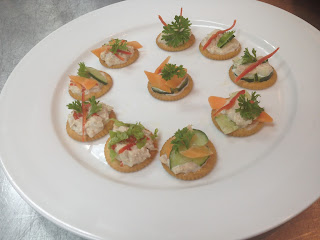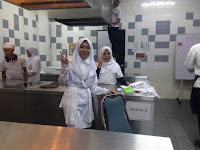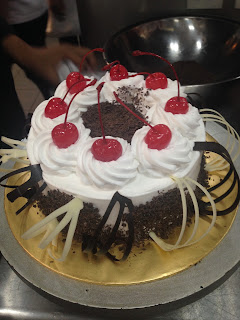CHAPTER 2 - DETERMINING FOOD AND BEVERAGES STANDARDS
What
is standard cost and cost tool?
Ø COST – expense to a
foodservice establishments for goods or services when the goods are consumed or
service are rendered.
Ø The cost of labor (people on duty)- value per hour or
value per week
Ø The cost of any item (meat) – value per piece, per gm
or per individual portion.
Ø The cost of drinks (liquor) – value per bottle, per
drink, or per ounce.
What
is cost material?
Ø the cost of purchase/plus all costs incurred in
getting the raw materials to the restaurant
Ø For
example rice, vegetable.
Ø Formula : Opening stock + Cost
of purchases - Closing stock - Cost of staff meals = Material cost
What
is labour cost?
Ø Wages and salaries paid to all employees plus any
employer contribution to government taxes, bonuses, meals, pension fund, and so
on
Ø For
example the wages paid.
Overhead
have three types that is:
Ø Indirect
material - Materials used to support the production process.
Ø Indirect labor - Materials
used to support the production process.
Ø Costs Related to the Manufacturing
Facility - Costs related to the production facility.
Element
of cost have two types that is:
Ø Controllable Cost - Costs that can be changed in the
short term
Ø Non controllable cost - Costs that are usually fixed
costs and managers do not have the ability to change it
The
relationship between cost and sales:
Ø Cost/ Sales = Cost %
Ø Cost / Cost % = Sales
Ø Sales x Cost % = Cost
Ø This formula can be extended to show the following
relationships,
Ø Food cost/ Food sales = food cost %
Ø Beverage cost/ Beverage sales = Beverage cost %
Ø Labor cost/ total sales = labor cost %
Standard purchase specification is
concise description of:
- quality
- Size
- Weight
- count factor desired for a
particular item,
Ø Specification
buying will give uniformity and consistency to purchasing and receiving that
will aid to maintain a desire food cost and create standard product
The
purchase specifications contain:
a. Definition
of each item.
b. Grade
or brand name of each item
c. Weight,
size, or count.
d. Unit
against which price should be coated.
e. Special
note for commodity.
Standard
Recipes
-
Recipe that has been tested and adapted
to the requirements of a specific foodservice operation.
-
Format = Recipe title, Yield and portion size, Yield and
portion size, Procedures, Recipe yield (amount produce by recipe), Ingredients
list, Recipe cost (optional)
Standard recipe, yields, portion size
and portion costs
Ø QUANTITY
= Number of portions x Portion size (as a decimal)
Yield
percentage
Ø NUMBER
OF PORTIONS = Quantity x yield percentage
Portion size
Ø PORTION
SIZE = Quantity x yield percentage
Number
of portions
Ø YIELD PERCENTAGE = Number of portions x portion
size
Quantity (original weight)



Comments
Post a Comment